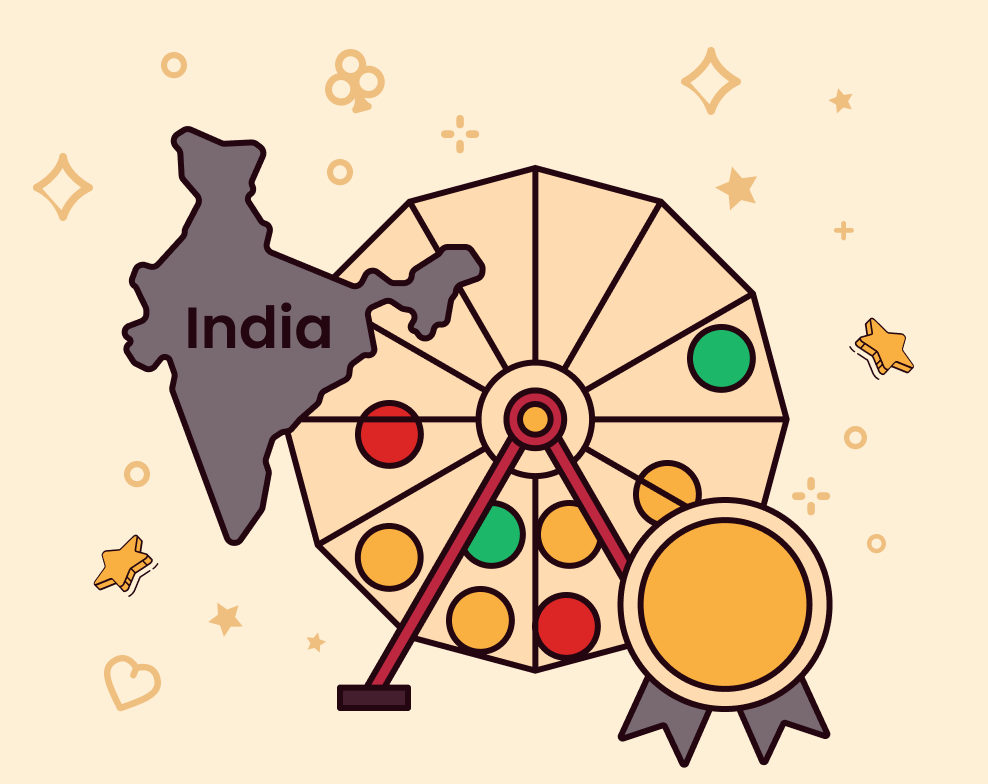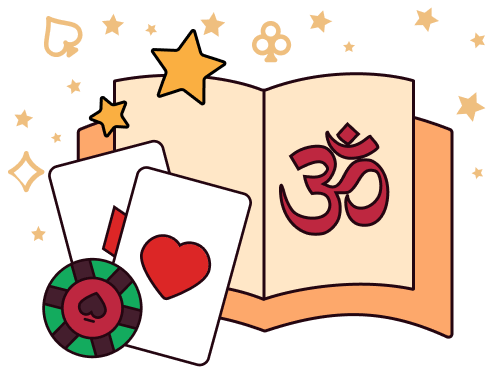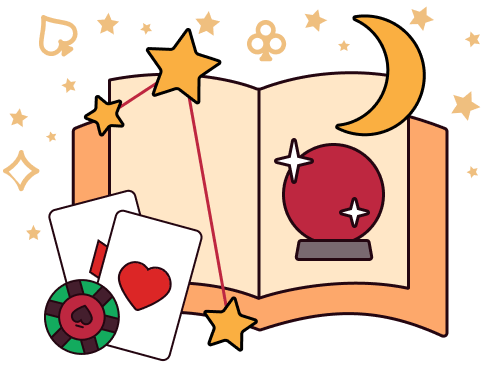
In casinos, we often hear phrases like good luck and good fortune. Not surprising, really, given how the majority of casino games are based primarily on chance, though some would claim that success is also down to mathematics and algorithms.
In any case, luck plays a crucial role in gambling, and many gamblers will have their own rituals they perform before games or even lucky charms they carry to improve their chances of winning.
Hinduism, one of the oldest practising religions in the world, believes in positive and negative energy, which could define your moves and outcomes. Furthermore, there are several ways one can channel these energies, whether through prayer or certain objects such as charms or symbols. We shall discuss these in more detail below.
History of charms in Hinduism
Historically, Hindu charms used to be in the form of amulets or yantras, which were gifted by priests to be used for prayer. These charms could be anything from a black thread to tie around your right ankle or a bracelet or ring featuring precious gemstones, such as pyrite geodes, diamonds, pearls, or tourmalines. Before then, tiger claws and elephant ivory were used in jewellery to protect a person from bad fortune.
Many casino players today believe in the power of lucky charms for gambling despite there being no scientific evidence to back up this superstition. Here are some lucky charms and objects still believed to wield great power in Hindu culture, which could, in turn, help bring you good fortune when you next play:
1. Rudraksha beads
The rudraksha is a seed from the rudraksha tree that grows in the Himalayan region of India and Nepal and is traditionally used for prayer beads. A rudraksha mala comprises 108 beads, a number which, in Hindu Vedic cosmology, holds great fortune and significance, believed to be the basis of creation and representing the universe. The beads are believed to promote inner peace, luck and knowledge, and shield the wearer from evil forces.

2. Sri Yantra
This is a mystical diagram comprising nine interlocking triangles. In the Shri Vidya school, it is believed to symbolise the union of masculine and feminine divine energies and is the object of devotion. Together, the nine triangles represent the totality of the cosmos, with the power point or “bindu” marking the cosmic centre. The Sri Yantra has today become a popular design, carved into objects and materials. Hindus often carry a miniature of it in their wallets as it is believed to bring wealth and prosperity.

3. Animals
Animals have been around as symbols of good fortune for centuries. Though certain animals have related to specific omens and signs across different cultures and religions, having a turtle or tortoise statuette in your home is said to bring good luck. This is also true of the elephant figurine and the frog.

4. Horseshoe
The horseshoe is another powerful good luck charm found in Hindu mythology. It is often found inside houses to ward off bad luck and diseases. Many people believe hanging it upwards is best as in that way it can catch and hang onto all the luck.

What are the most important symbols in Hinduism?
Along with charms, symbols carry great meaning and significance in Hindu culture. Many are believed to represent good fortune and success. Here are some of the most prevalent:
1. Om: Pronounced as “Aum”, Om is considered the most important symbol in Hinduism, representing consciousness and the ultimate reality. It signifies a sacred sound, chant, mantra and syllable. The spiritual incantation is typically recited during puja and private prayers, in rites of passage ceremonies such as weddings, and meditative activities like yoga. Many Hindus will even carry the symbol with them on stickers and small pocket photographs or write it on bookkeeping and accounts notes for good luck.

2. Swastik: In the west, the swastika has serious negative connotations due to its affiliation with the Nazi Party, but in the east, it is an ancient symbol representing divinity and spirituality. In Hinduism, the right side is supposedly an ode to the Hindu goddess, Lakshmi, and so symbolises prosperity and good luck, while the left side is for Kali, another Hindu goddess associated with creation, power, destruction, and death. Swastik symbols are prevalent in Hindu households, typically found at the entrance of homes to bless everyone who enters with good fortune.

3. Kolam: Again, this geometric symbol is believed to bring prosperity to households and can be found in front of millions of home entrances in the southern states of India. Traditionally, it is drawn using rice flour, although you can also use white stone powder or chalk. Kolam patterns are also used for special occasions such as weddings.

Lucky numbers and colours
In all cultures, certain numbers are believed to carry good luck and by identifying your own lucky number, you can increase your winning odds when playing games of chance such as slots, roulette, or the lottery, for instance.
Seven and eight are two of the most common lucky numbers in Hinduism. The number eight is associated with the goddess Lakshmi. One of the most revered and best-known Indian deities, she is responsible for wealth, beauty, fortune, and prosperity, which is why her image can be found in almost every business establishment across India.
Another lucky sequence of numbers is 786. It stands for the Trinity of Brahma, Vishnu, and Shiva, as these are their respective related numbers.
Three is another popular choice, considered to hold great significance and power in many cultures, including Hinduism. The number is a symbolic depiction of the Hindu symbol, Om, and again, marks the Trinity. As we’ve already mentioned, 108 is also considered auspicious, and Hindus will often chant mantras 108 times as it is said to help bring harmony.
In terms of colours, red is considered sacred. Symbolising love, passion, life, and strength, it is prevalent in religious ceremonies and important occasions, such as weddings, the birth of a child, and festivals.
Conclusion
As we’ve highlighted, Hindu mythology contains countless symbols and good luck charms, and we have only touched the surface in this article. As we all know, luck plays a crucial role in gambling, whether it be happening to choose winning lottery numbers or placing your chips on the right pocket in a game of roulette. As it is near impossible to predict the outcome, many of us must rely on luck to increase our odds of winning.
So, whether you consider carrying a lucky charm, wearing red, or playing only your favourite numbers, why not try putting your faith in the power of good fortune and you never know, you might succeed in breaking that unlucky streak!
The Latest News


Ana D.
•May 30, 2024
Lotteries and other forms of gambling have a colourful history in India. While lotteries are regulated under a central umbrella, how they are managed is subject to the discretion of state governments. However, the growing popularity of lotteries saw the Lotteries (Regulation) Act of 1998 and the Lotteries (Regulation) Rules 2010 introduced, which established detailed standards for the governments to follow.
Currently, lottery games are legal in 13 Indian states, though anyone of legal gambling age in India can buy international lottery tickets online. The ticket prices and prize pools of government lotteries in India vary depending on the lottery scheme and state in which it is regulated. Tickets for weekly draws begin at modest prices like ₹2 or ₹5 and increase for bumper draws and special schemes.


Akil Khan
•March 21, 2024
Whether you like it or not, luck plays a crucial role in gambling. And while many would argue that it’s an unreliable force, for many Indians, the ancient tradition of Vedic astrology offers a way to understand how luck works in the universe and how one could potentially manipulate it to work in one’s favour.
Vedic astrology (known as Jyotish in Sanskrit) is the practice of studying planetary positions, celestial influences, and karmic patterns to understand how these influence and shape human lives and destinies.
When it comes to gambling, some Indians look to Vedic astrology to boost their chances of success. By analysing astrological charts and horoscopes, and identifying cosmic connections, gamblers seek to find the most advantageous time to gamble, looking for lucky combinations of numbers, or even charms and rituals to help improve their chances.
Let’s look at this more closely:
Planetary configurations
"Muhurtha", an essential principle of Vedic astrology, indicates the opportune time to partake in certain activities based on planetary configurations. It also highlights when best to avoid certain activities. So, in the case of gambling, a player would wait for a favourable Muhurtha to maximise their chances of success.
Presence of the planets
Vedic astrology focuses on nine “grahas”, which are collectively referred to as the “navagrahas” (nava meaning nine). They include the sun (Surya), moon (Chandra), Mars (Mangala), Mercury (Budha), Jupiter (Brihaspati), Venus (Shukra), Saturn (Shani), Rahu (north node of the moon), and Ketu (south node of the moon). According to Vedic astrology, the planet Venus offers luxury and Jupiter provides immense wealth. A conjunction of Jupiter and Venus unafflicted with the moon is therefore said to bring good luck and prosperity.
Birth charts
Many Indians strongly believe in analysing their birth chart in every aspect of their life. This comes from Vedic astrology, which argues that the alignment of different celestial bodies at your birth can provide invaluable insights. In the case of betting, it could highlight a person’s gambling and risk-taking tendencies and subsequent strategies they could employ to maximise their chances of winning, translating into profits and success.
Astrology and numerology
Hindus love to rely on their favourite numbers, particularly when it comes to gambling, and generally prefer odd numbers over even. Seven and eight are considered auspicious numbers, representing success and prosperity. Many Hindus also use these numbers at the time of Diwali when, in some houses, gambling is a ritual. Another lucky sequence of numbers in Hinduism is 786, representing the Trinity of Brahma, Vishnu, and Shiva.


Ana D.
•February 29, 2024
While the lottery is undeniably a game of chance, this guide offers some nifty ways to boost your odds when selecting those crucial numbers. We'll take you through eight different approaches, sharing our expert insights and tactics.